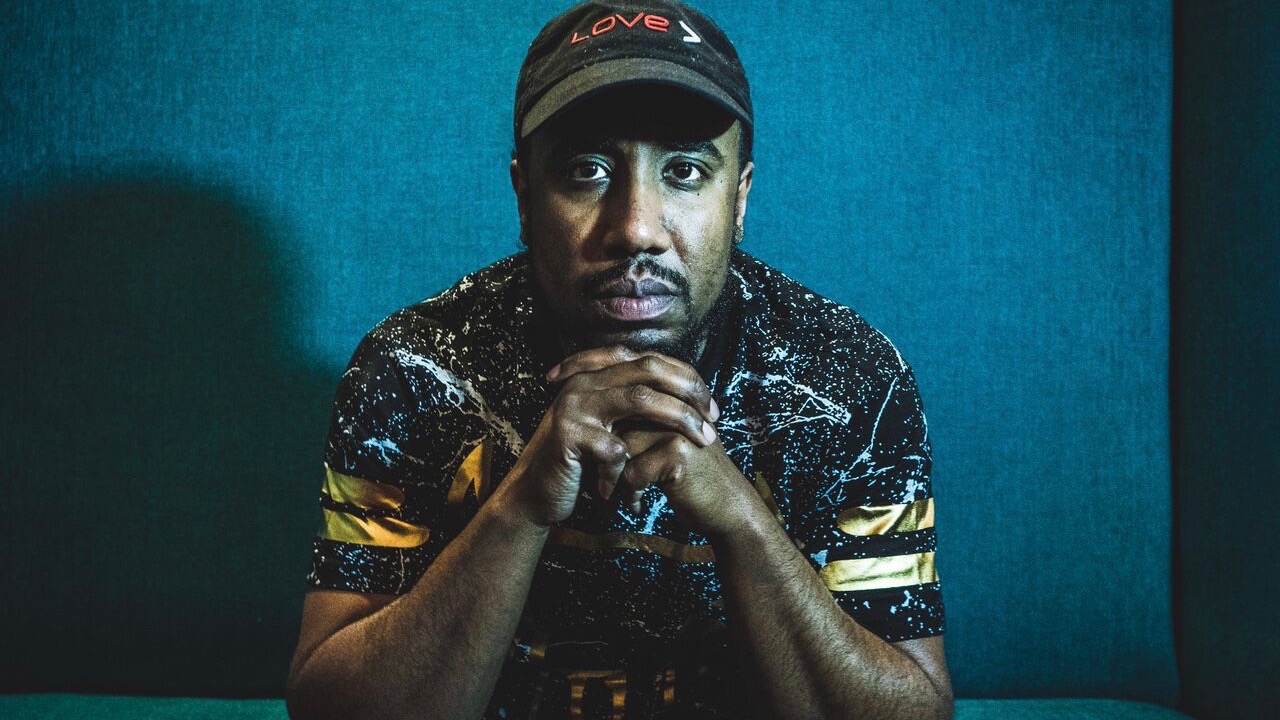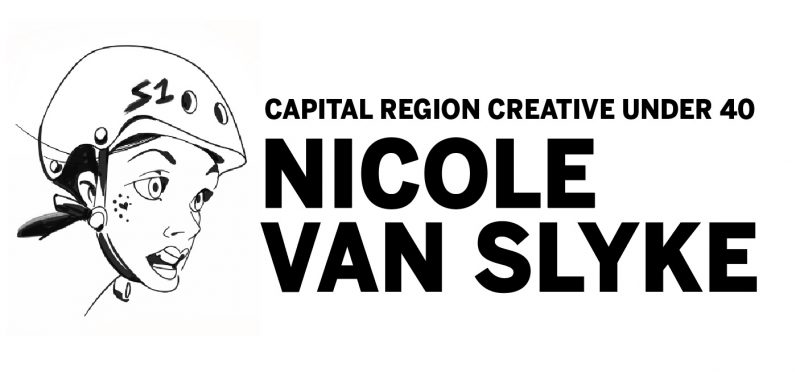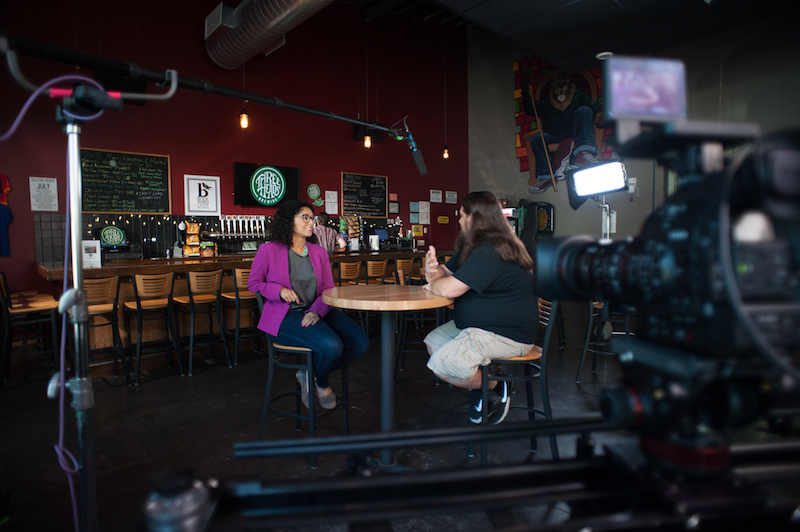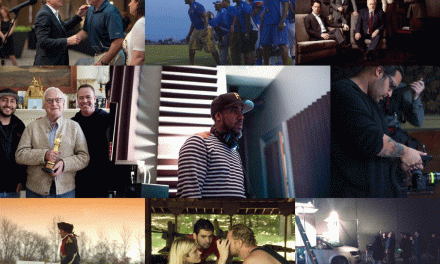This article first appeared in The Alt on April 25, 2017.
Photos by Kiki Vassilakis
“This movie is gonna kill,” mutters Prince Sprauve, voice uncharacteristically tight. “It has to kill. We’ve got one chance, one shot.” He turns to Josh Rivera, the acting coach. “Man, I feel like Eminem in 8 Mile,” he says, and cracks a grin. Everyone laughs, and Sprauve joins in, after a moment.
The small team is casting for TBU Productions’ new movie, Cradle. The film tells the story of six teenagers attending Schenectady High School, as they deal with pregnancy and understanding what it means to be a parent when you yourself are still a child. The movie will follow the kids over nine months of the school year — and over the nine months of a pregnancy. The city of Schenectady has one of the highest teen pregnancy rates in New York State and Sprauve isn’t just looking to make a drama, he is looking to change lives.
“Send the next one in?” asks Francesco Archina, the screenwriter.
“Yeah,” says Sprauve. “Let’s do this.”
The next actress is seen, she reads her lines, she is sent out of the room. There ensues a healthy debate over whether or not she has what it takes to star in a TBU joint. A conclusion is drawn; she is marked down as a possibility. The next actor is sent in. Rinse, repeat. The casting process lasts hours, but that’s okay.
Because as Sprauve tells the actors who make the final cut; the filmmaking life is about the grind. “This business is hard work. It’s long hours. Long shoots. Long days,” Sprauve says, one week later, to the group of actors who are called back. “You can’t just say your lines once or twice and you’re good. It’s not saying the lines once, it’s fifty times,” says Sprauve, quietly. His voice, hoarse, worn thin from use, commands respect from the entire audience — the twenty or so teenagers and young adults who are sitting before him are just one more favorable decision away from starring in their first movie.

“If you say you can’t do this; if you can’t commit, I understand,” says Sprauve, kindly. It’s understood what he’s doing; he’s giving his actors an out. But the flipside to the offer is a promise that you will be held to high standards if you choose to come on board. It is the daunting pledge that if you sign on with TBU, you will be taken seriously; as an actor, as a professional, and as an artist.
Prince Sprauve is here to change lives. And he can only do that, turns out, if his kids want to be changed in the first place.
***
Davon Stallings is frozen in his chair. He listens to Sprauve speak about commitment and hard work; there’s a look of awe on his face. Maybe it’s fear. I’m not really sure. I won’t be able to debrief him on his auditioning experience; call-backs run so long, I have to leave early.
I’ve been following Stallings since the walk-on auditions began. He’s a handsome kid: twenty-one, with an easy smile. “I’m more excited than scared,” Stallings tells me, eyes wide with sincerity. He’s a YouTube vlogger, and enjoys improv theater, though he’s looking for something more grounded. “I have commitment,” he tells me, and I believe him. “I want to be on this project, behind the camera or in front of it, and I want to be on the next project, and the one after that.”
Stallings is trying out for Hector, the biracial baseball star whose life is derailed when he gets his girlfriend, Clara, pregnant. His audition is subdued — he is asked to stop and start over; to really demonstrate his passion for the role. But where Stallings really shines is his passion for the project itself. “I will do whatever it takes,” he tells the filmmakers. “I will move chairs around, if you need me to.”
“He gets a call-back just for his attitude alone,” says Archina, visibly impressed.

“A lot of people don’t know this, but when I was doing Fast Life, I was at the worst point in my life,” Sprauve tells me, in his cozy office on the second floor of Proctors; the room is tucked away in an upstairs warren that few theatergoers will ever end up seeing. “I was living in a shelter. I remember walking with my camera and all the equipment in the snow to locations to shoot, because I didn’t have a car.”
Fast Life was the first feature length film Sprauve ever made — it was birthed from a filmmaking after-school program at Schenectady High School that Sprauve had started. The 2013 movie reflected the personal experiences of the students themselves; the tough themes of abandonment, of personal loss and pain were represented in abundance. “That’s how we did it,” says Sprauve. “With heart and pain and love, those kids followed me. They followed me to the end.” He chuckles. “Half the time I didn’t know what I was doing, but they still followed me.”
The first year, only 19 minutes of the film were shot. The project almost never saw completion. “I remember one day I’m sitting at my computer and the computer crashes. I’m just sitting there like ‘oh my god,’” says Sprauve. He thought he had lost all 19 minutes of footage.“I was saying to myself, ‘it’s done. It’s a wrap.’ I’m this close to leaving the school district, leaving the whole program — it wasn’t worth staying anymore,” says Sprauve.
But then Sprauve’s luck turned.
“I went back to the high school, and realized I forgot that I had three external hard-drives attached to the computer,” says Sprauve, leaning back; smiling. Everything was saved — every scene. The 19 minutes were safe. “I was so fixated on the crash, I didn’t think about the hard-drives. That’s when I knew it — there was something to this movie. It wasn’t just a movie. I knew there were big things on the other side. And I went crazy that year, the second year. We shot and reshot, and made the next hour and a half of the movie.”
“That’s the night I figured out that nothing is impossible. Nothing,” says Sprauve.
The movie premiered at Proctor’s to a packed house — all of Schenectady High School showed up for the premiere, or so it seemed. “I’m going to say that besides getting married, that was the best day of my life,” says Sprauve.
The energy of that premiere, the experience of making Fast Life itself: it propelled Sprauve into thinking about what it would take to take this further.
“Nobody ever told me I could turn this program into a nonprofit,” says Prince. “And when I started asking how I could do it, there was a little pushback; some people wanting to know what I was trying to do, and why I was trying to do it.” But Prince prevailed, establishing Revolution Studios, later rebranding as Told By Us Productions. “We want to be able to tell our story,” says Prince. “Because nobody else is going to be able to tell it. We don’t want anyone controlling our narrative.”

The most coveted role, for the girls, is Chante Briggs — she is the heart of Cradle, and her emotional arc will carry the film through. Chante is black, “insecure, shy, not quite beautiful,” according to the character description made available before auditions. She gets pregnant by Shawn, a tougher, older boy, and she is forced to do a tremendous amount of growth in a short amount of time. The actress who plays her must demonstrate a raw vulnerability; an innocence that manages to peek through the tough protective hide which so many girls in this community have developed.
Thankfully for the filmmakers, there are two talented actresses competing for Chante, both of them formidable talents. First is Mahogany Akita, 17, a student at Lake George High School, who has come further than most to audition, her patient and supportive mother sitting beside her. “I’m thinking of Marymount Manhattan, or the Alvin Ailey School,” she tells me when I ask about college plans, her eyes shining with excitement. She’s a dancer; a talented one at that.
Akita’s competition is Hope DaViincii, an Albany teenager who was recruited to audition by Sprauve personally. DaViincii — her “stage name”, not her birth name — is a ham; she is a funny, funny girl, and during call-backs, induces peals of laughter in her peers, breaking up an otherwise tense environment with some levity. She chooses to applaud her competition — enthusiastically clapping after Akita executes a scene as Chante particularly well. Everyone giggles at DaViincii’s sass, but a few hours later, it has become the norm, in the room, for onlookers to applaud an audition that is emotionally poignant — to cheer each other on.
For the initial auditions, I was party to the chatter between casting agents; I was in the room as Archina, Rivera, and Sprauve openly discussed their candidates. For call-backs, the huddle grows tighter; voices quiet down — it is harder to get a read on how the team feels. Even so, I can sense the glee rising off Archina. There is an absolute glut of talent in this room; an embarrassment of riches with these girls — not just DaViincii and Akita, but many more actresses in the room. Casting has now become more a matter of seeing who fits the part physically, who has chemistry with each other and who doesn’t, than seeing who can act and who can’t.
The movie is slated to come out next spring — one year of crunch, of rehearsals, of filming, of editing — a heart-stopping whirlwind of a process that will culminate in a premiere. The projected budget for the entire project is somewhere around $400,000, and the funding comes from The Schenectady Foundation, from the Wright Family Foundation, from the Carlilian Foundation, from the City of Schenectady. Proctor’s donated in-kind; making space and resources available to Sprauve and his team.
TBU Productions is moving closer and closer to having a movie.
***
“The reason the TBU team works so hard is because I want to give my kids the best,” says Sprauve, back in his studio. “I want them to have the best experience they can possibly have. Because I know most of our programs don’t give that. They give just enough. I pride myself on kids feeling like they are joining the best situation they could be in — as artists. As actors. As people. As teens.
“Every kid in our our program doesn’t act, or sing. Plenty of kids do administrative things for us. The point is the connection to a family — that’s what they want. They want to be loved, cared about, listened to, talked to, just like anyone of us.
Prince sighs — it’s a weary sound, laden with frustration. “You’d think that these kids would get the majority of the attention,” he says. From policy makers, he doesn’t say. From the powers that be. It is implied; it is understood. “You’d think these kids would be at the forefront. They’re not. They’re poor. They don’t have a vote. They don’t have a say. They don’t have anyone backing them. And they’re seen as the problems,” says Prince, incredulous.
“I hate when people say stuff like ‘oh, what about all these kids killing each other?’” says Prince. He grows animated. “We know that. We know it’s a problem. Nobody’s ignoring that. But what we’re saying, is that there’s a bigger problem on top. It’s like these kids have been to Vietnam — any other war. You see blood and guts, you see people dying every day and hour, and you come back to the normal world, and you’re told to be a citizen again. It doesn’t work that way. This person has to be detoxed.”
The only way to heal the wounds that trauma creates — generational trauma, trauma caused by racism and poverty and violence and drugs — is with love. It is to make his kids feel safe, maybe for the first time.
“Words are life and death, man,” says Sprauve. “Words are so much more lethal than guns, than any atomic bomb. Just being told you can’t do something — people die every year never believing that they could achieve what was in their mind. All because someone told them it couldn’t be done.”






Trackbacks/Pingbacks